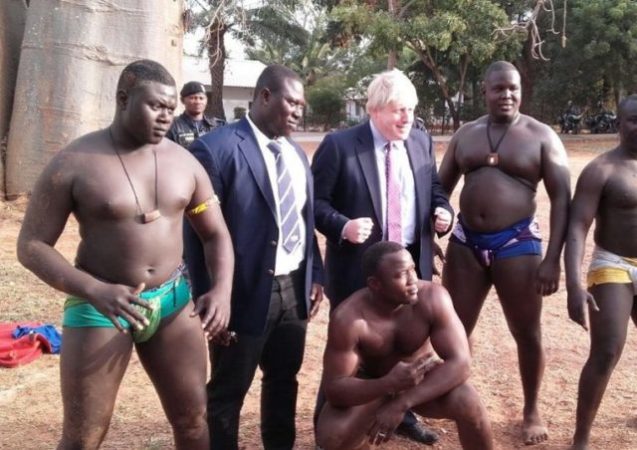
Boris Johnson enjoys a presentation of traditional Gambian wrestling on his first visit to Africa
The opposition MPs in the UK are not happy with Boris Johnson over comments supporting Britain’s colonial activities in Africa. While a Tory MP, Johnson wrote in a 2002 article that colonialism in Africa should never have ended, arguing that Africans would not have grown the right crops for export if Britain had not directed them.
“The continent may be a blot, but it is not a blot upon our conscience,” he wrote while editor of The Spectator magazine. “The problem is not that we were once in charge, but that we are not in charge any more.”
In the wake of global anti-racism protests that have targeted monuments connected to slavery and colonialism, the British prime minister argued this week that such colonial-era figures should not be toppled because they “teach us about our past with all its faults”.
However, his 2002 article shows that Johnson has held the belief that British colonialism wasn’t a disaster while dismissing Britain’s role in slavery.
“Consider Uganda, pearl of Africa, as an example of the British record. Are we guilty of slavery? Pshaw. It was one of the first duties of Frederick Lugard, who colonised Buganda in the 1890s, to take on and defeat the Arab slavers,” the former journalist and columnist says in the article cited by the Independent.
“And don’t swallow any of that nonsense about how we planted the ‘wrong crops’. Uganda teems, sprouts, bursts with vegetation. You will find fruits rare and strange, like the jackfruit, hanging bigger than your head and covered with green tetrahedral nodules. Though delicately perfumed, it is, alas, more or less disgusting, and not even Waitrose is pretentious enough to stock it.”
“So the British planted coffee and cotton and tobacco, and they were broadly right. It is true that coffee prices are currently low; but that is the fault of the Vietnamese, who are shamelessly undercutting the market, and not of the planters of 100 years ago.
“If left to their own devices, the natives would rely on nothing but the instant carbohydrate gratification of the plantain … the colonists correctly saw that the export market was limited.”
The loud and controversial former London Mayor and UK foreign secretary further writes: “The best fate for Africa would be if the old colonial powers, or their citizens, scrambled once again in her direction; on the understanding that this time they will not be asked to feel guilty.”
Johnson is yet to state whether he still stands by the comments he made in the piece as pressure mounts on him to come clear on his views.
“Boris Johnson is the prime minister of the United Kingdom. The history of the UK, Windrush, empire, colonialism should be told with sobering accuracy,” Labour MP Dawn Butler told The Independent.
“In order to make sustainable progress we need the current PM who has power and privilege to reflect on what he has said and written.
“I urge the PM to review his previous articles, books and statements and to re-examine them through the brutal lynching that he watched of George Floyd and say whether he regrets anything of what he has said, done or written in the past.”
In July 2019 when Johnson emerged as the new prime minister of the United Kingdom after a leadership contest, there was controversy surrounding his premiership due to some racist, homophobic and sexist statements he has made in the past.
Touted by some as ‘the British Trump’, Johnson has many times made infamous comments about Africa that denigrated the continent.
In 2002, before the then UK Prime Minister Tony Blair visited the Democratic Republic of Congo, Johnson wrote in the Daily Telegraph: “No doubt the AK47s will fall silent, and the pangas will stop their hacking of human flesh, and the tribal warriors will all break out in watermelon smiles to see the big white chief touchdown in his big white British taxpayer-funded bird.”
His comments were condemned as racist and Johnson was compelled to apologize when he ran for mayor of London six years later.
Writing on former British Prime Minister Tony Blair’s visits around the world, Johnson used the term “piccaninnies,” a racist term used to describe black children.
He wrote in the Daily Telegraph in 2002: “What a relief it must be for Blair to get out of England. It is said that the Queen has come to love the Commonwealth, partly because it supplies her with regular cheering crowds of flag-waving piccaninnies; and one can imagine that Blair, twice victor abroad but enmired at home, is similarly seduced by foreign politeness.”



















